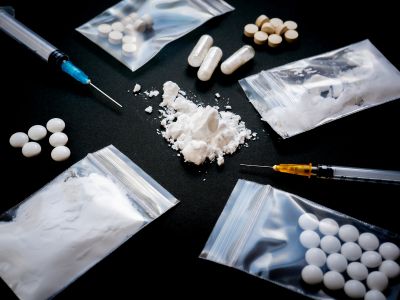Addiction is a widespread and ongoing sickness that impacts millions of people worldwide. It is marked by an excessive dependency on a specific drug or behavior, making it challenging for those affected to stop or reduce their use.
This blog dives into various common types of addiction, shining light on their signs, symptoms, and available treatment choices. From drinking to internet addiction, we’ll study the various forms that addiction can take and stress the importance of finding assistance.
1. Alcoholism: A Troubling Dependence

Alcoholism is a grave form of addiction focused on an uncontrolled desire to consume booze. This chronic disease has far-reaching effects on both physical and mental health. Liver damage, heart disease, and stressed relationships are among the dire effects of drinking. Key signs and symptoms include:
- Drinking alone or in secrecy
- Using alcohol as a coping mechanism
- Neglecting duties due to drinking
- Continuing alcohol use despite bad outcomes
- Developing a resistance to alcohol
- Experiencing withdrawal symptoms when not drinking
Effective methods embrace cleansing, medicine, therapy, and support groups, giving a complete approach to healing.
2. Drug Addiction: Trapped by Substances

Drug addiction includes dependence on various substances, including both illegal drugs and controlled medicines. This form of addiction can lead to serious health effects, such as overdose and heart problems. The effect spreads through relationships, work, and daily life. Signs of drug addiction involve:
- Persisting drug use despite harmful effects
- Neglecting duties due to drug abuse
- Building resistance to drugs
- Experiencing withdrawal signs in the lack of drugs
- Using drugs to handle stress or feelings
Treatment choices match those for drunkenness, including cleansing, medicine, treatment, and group support.
3. Tobacco Addiction: A Deadly Habit

Tobacco addiction revolves around the dependence on tobacco goods like cigarettes, cigars, and chewing tobacco. The health effects are serious, with a heightened risk of lung cancer and heart problems. Signs of tobacco addiction comprise:
- Continued tobacco use despite negative effects
- Developing a tolerance to tobacco
- Experiencing withdrawal symptoms without tobacco
- Using tobacco to cope with feelings
Effective methods for beating tobacco addiction involve nicotine replacement therapy, medicine, therapy, and support groups.
4. Sex Addiction: Hidden Struggles

Sex addiction is a relatively common condition (potentially affecting 3% of the adult population). Individuals with a sex addiction compulsively seek one form of sex or another. Sex may provide a sense of validation or it may provide a pleasure that the person becomes hooked on. This addiction is marked by an excessive need for sexual acts. This addiction takes a toll on relationships and general well-being, leading to problems like cheating and broken marriages. Indicators of sex addiction encompass:
- Engaging in sexual behavior despite bad outcomes
- Ignoring duties due to sexual acts
- Building resistance to sexual behavior
- Experiencing withdrawal signs in the lack of sexual activities
- Using sex to cope with mental stress
Sex addiction can also include cybersex or sexting. Treatment does not require people with sex addiction to give up on sex. Rather, it helps them reframe sex within a healthy context that encourages moderation. Treatment mainly revolves around therapy and support groups, helping people recover control of their lives.
5. Gambling Addiction: Betting on Trouble

Gambling addiction hinges on an excessive dependence on gambling behavior, resulting in serious financial and mental health problems. Gambling provides a thrill due to the very real stakes, and an addiction to it can lead to financial ruin. Some gambling addicts try to use it as a way out of financial strife, only to fall further and further into trouble. Others use it in a self-destructive way, becoming more careless as time goes on. This addiction can lead to financial trouble and even mental health issues like sadness. Signs of gambling addiction include:
- Persistent gambling despite negative effects
- Neglecting responsibilities due to gambling
- Developing resistance to gambling
- Experiencing withdrawal effects when not gambling
- Using gambling to cope with mental stress
For them, the thrill is vivid and the allure of VIP treatment in a ‘Winners’ Circle’ is strong. Therapeutic programmes and support groups offer paths to recovery for people stuck in the circle of gambling addiction.
6. Smartphone Addiction: The Digital Quandary

Social media and smartphone addictions are seen by many as something not to be taken seriously. Part of the reason for this is that almost all of us are, to some extent, dependent on our phones. When we feel distressed, we reach for them, and we have come to see that as normal.
This addiction involves an over-reliance on smartphones, often at the cost of mental health and real-world relationships. This addiction can lead to conditions like worry and sadness. Indicators of smartphone addiction comprise:
- Excessive smartphone use
- Neglecting tasks due to smartphone dependency
- Developing resistance to smartphone use
- Experiencing withdrawal symptoms when not using a smartphone
- Using smartphones to control mental stress
- They struggle to go without their phone even for short periods of time. They are also likely to find a decreasing amount of comfort in their phone.
Treatment choices include treatment and support groups, helping people re-establishing a healthy relationship with technology.
7. Shopping Addiction: The Spending Spiral

Shopping addiction involves an excessive desire to shop, resulting in financial strain and marital problems. This addiction can lead to excessive spending and broken ties. Signs of shopping addiction encompass:
- Unrestrained shopping despite bad outcomes
- Neglecting tasks due to shopping compulsion
- Developing resistance to shopping
- Using shopping as an emotional comfort strategy
Therapeutic methods, such as treatment and support groups, offer people a chance to regain control over their spending habits.
8. Video Game Addiction: The Virtual Hold

Video game addiction is defined by an excessive need to play video games, often at the cost of mental well-being and human relationships. This addiction can lead to mental health issues like worry and sadness. Indicators of video game addiction include:
- Excessive video game playing
- Neglecting duties due to gaming
- Experiencing withdrawal symptoms without gaming
- Using video games to handle mental stress
Recovery from video game addiction is doable through therapy treatments and support groups.
9. Food Addiction: The Battle with Consumption

Food addiction refers to an excessive dependence on specific types of food, leading to negative effects on both physical and mental health. This obsession can lead to fat and heart problems. Signs of food addiction involve:
- Overindulging in specific foods
- Developing resistance to certain foods
- Experiencing withdrawal effects without those foods
- Using food to cope with mental stress
Recovery tracks from food addiction involve treatment and support groups, leading people towards better relationships with eating.
10. Internet Addiction: Trapped in the Digital Web

Internet addiction entails an intense need to be online, often resulting in mental health problems and strained relationships. This addiction can lead to conditions like worry and sadness. Signs of this addiction include:
- Excessive internet use
- Neglecting duties due to online dependency
- Experiencing withdrawal symptoms when offline
- Using the internet as an emotional healing strategy
Recovery paths from internet addiction involve treatment and support groups, helping people create a healthy relationship with the online world.
Conclusion:
Addiction, a lasting disease that affects countless lives internationally, brings forth extreme effects spanning physical health, mental well-being, and interpersonal relationships. Throughout this article, we looked into different types of addiction, their warning signs, symptoms, and the array of treatment possibilities.
Whether dealing with gambling or internet addiction, it’s important to seek assistance. An array of tools, including therapy, support groups, and specialized addiction treatment centers, stand ready to help. Remember, healing is possible, and a better future is within reach.




